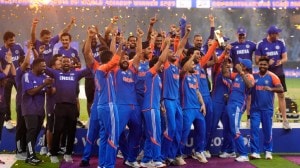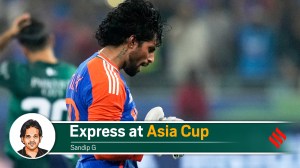Sweeping India off its feet
Whether we make the nuclear club status or not depends on India’s Parliament and the US Congress. The latter will count more because it...

Whether we make the nuclear club status or not depends on India’s Parliament and the US Congress. The latter will count more because it is staunchly opposed to proliferation. Yet, long before that happens, we have earned the reputation of being pro-US. The defence agreement and the nuclear deal with Washington have given the impression that India has moved towards the right (read pro-West). London’s support has only underlined this. We, who were so particular about staying equidistant from both the western and eastern blocs during the Cold War, have landed ourselves in a situation where we are not seen all that independent. On the one hand, some people in the establishment argue that if we want to achieve a growth rate of 10 to 12 per cent, we have no option except to tilt towards the US to get the necessary edge. On the other, there are equally strong voices arguing that India has become the 52nd state of the US and from now on every action of ours — economic or political — will be at Washington’s bidding.
Both viewpoints, I believe, are exaggerated. Nurtured in a long struggle against colonialism and imperialism, India can never become a client state. People have imbibed the spirit of independence. Befriending the countries which have been largely against us does not mean giving up on our stand. Pluralism has taught us tolerance, a feeling that others too have some share of the truth and that there are all shades, that things are not just black and white. We cannot instinctively be part of one ideology or one side.
Still, in our heart of hearts, we know we have restricted our right to speak against America. My worry is that the government may exaggerate its intrinsic strength or the capacity to say no, despite the prime minister’s statement in Parliament, and will compromise when besieged by immediate needs or pressing demands. The vicarious satisfaction of having the most powerful country in the world as an ally can be a heady wine. Some in the government can be swept off their feet. At the same time, many countries are going to say that India, too, has turned pragmatic, not principled. Only a few months ago did we give a lead to reviving the non-aligned movement (NAM) and infuse life into it. More than a hundred nations rallied behind the concept. They have preferred to stay quiet but reports say they are now wondering about our exact status.
Going by India’s record at the UN, it is clear that it has voted many more times against America than in its favour. The US Congress has justified its opposition to India’s proposals because of our attitude. After the deal at Washington, we will have to think twice before voting against America. I have no doubt that we will make our own judgment. But we may be hamstrung by the thought of how Washington would like us to vote. This is inevitable. We, too, have realised that there are no free lunches.
Jawaharlal Nehru strongly refuted the position of then US secretary of state, John Foster Dulles, that those who were not with America were against it. Secretary of State Condoleezza Rice has not said anything similar. But her statement that India is a countervailing force against China is meaningful. Beijing is a close neighbour with which we are trying to normalise relations. New Delhi has said that its proximity with America will not be at the expense of China. This enunciation is all right when the question of choosing does not arise. But suppose China were to attack Taiwan and the US decides to defend it? Can we stay neutral when we have a defence pact with Washington, saying that our “strategic interests” coincide?
Our problem with the US will arise if, and when, we implement our gas pipeline project with Iran. Rice has already expressed her unhappiness over it, and Tehran has yet to allay Washington’s fears on the nuclear programme. Europe is trying its best to convince Iran not to go ahead with its peaceful nuclear programme. If there is no clear-cut assurance, America may not want India to go through with the gas pipeline deal. Even otherwise, Washington could ask why New Delhi would want costly gas when America has given it access to nuclear components and fuel.
I wish India could continue to work for nuclear disarmament. That has been our stand. I vainly looked for a reference to it in the prime minister’s address to the US Congress and his joint statement with President Bush. After exploding the bomb, the strategists and experts (God save India from them) are obsessed with the idea of building a huge nuclear arsenal. They should know that one bomb is enough to destroy almost the whole of northern India. Whether we admit it or not, our nuclear ventures have goaded Islamabad to follow suit. The first blast by Indira Gandhi forced Zulfikar Ali Bhutto to remark: “The Pakistanis would eat grass and save money to make the bomb.” Ultimately, Islamabad did just that. The Atal Behari Vajpayee government exploded the device to let the world know that India had the bomb. Pakistan did likewise. Then Pakistan Prime Minister, Nawaz Sharif, told me at Islamabad that if India had not exploded the bomb, Pakistan would not have done so. Once New Delhi did so, he had no choice because of public pressure.
By this time we should have had a serious dialogue with Pakistan to reach an agreement to do away with nuclear weapons. Our effort to amass conventional armaments does not add to much because Islamabad has said that it would straightaway use the bomb if there were a war between India and Pakistan. Was there no way to get from America the access to the latest nuclear technology and fuel for civilian purposes, without compromising on our policy to stay independent and judge every issue on its merit? But then the obsession to join exclusive nuclear club seems to have fired some elements in the government so much that they were prepared to forget the vision India of disarmament that India once had.



- 01
- 02
- 03
- 04
- 05




























